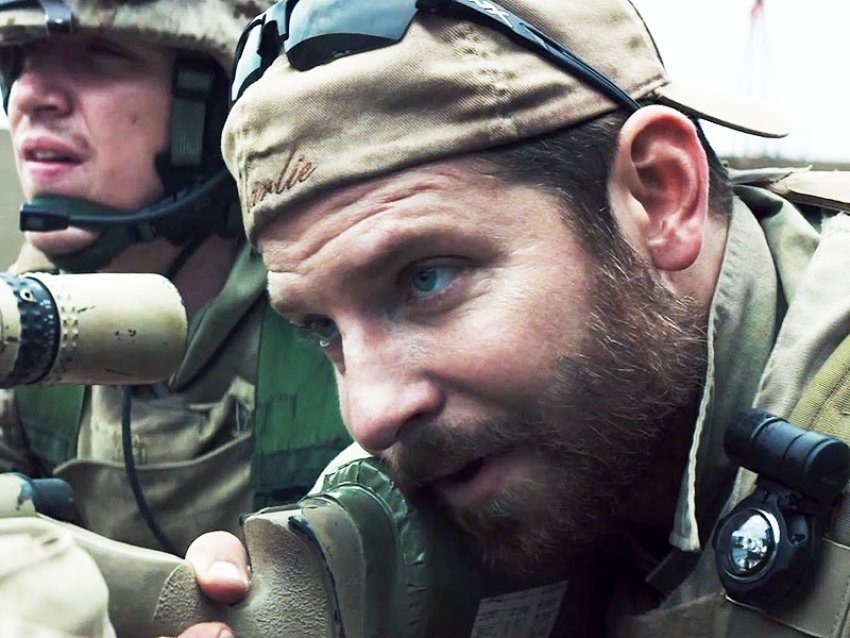
American Sniper
Directed by Clint Eastwood
Starring Bradley Cooper & Sienna Millar
In cinemas now
Clint Eastwood’s American Sniper has two clashing narratives. The first is about a soldier in the US army (i.e. the content of the film). The second is much bigger, about war and terrorism (i.e. the content of the discussion the film has generated).
The movie fails not in explaining these two topics properly and, as a result, leaving it up to the viewer to make up their own mind whether the action of the soldier should be applauded.
Of course, for many, the view of an American soldier fighting for freedom while US corporations exploit the world’s resources and the US government remains so corrupt is laughable.
One could almost imagine an Australian movie about a British soldier writing home about his valiant efforts while going to war against the Aboriginal people. The problem is we never consider the power structures and whether our actions are legal or moral.
That said, the movie itself isn't that bad and I don't blame the movie for the context in which it was created. However, it certainly does highlight the self-centered attitude of Hollywood.
It is worth watching to understand how a film can prove so inflammatory. That is not to say I liked it. There were so many things wrong with it, such as:
- The story of the sniper’s wife had no depth and she was quickly objectified.
- The movie quickly skipped over the fabrication of details to legitimise the illegal invasion of Iraq.
- The story ignored the stories of civilians in the Middle East.
- It seemed to breeze past the harsh reality of suffering Post Traumatic Stress Disorder way too easily. This reminded me of a Monty Python sketch: “I had PTSD ... but I got better.”
In fact, the only thing this movie seemed to accomplish was to make me think about how I was going to react at its conclusion.
I was left wondering whether it was all worth it. I get that the movie was trying to tell the story of the difficult experience of a soldier in war, of the camaraderie he had with other soldiers, but we already know all of that.
There are many wars happening all around the world, but as they clash with US or corporate interests, they remain absent from the mainstream.
Maybe it was wishful thinking on my part that the story would progress past the typical “American freedom” dialogue and into how soldiers deal with PTSD and transition back into society.
I thought it was going to do just that, but all of a sudden he made a miraculous recovery. Clearly anything criticising the US government's failings surrounding returned soldiers would be controversial. Telling the truth hurts, but ignorance is bliss.
The only way this movie could have regained some appreciation from me is if the movie showed the truth about the occupation, incarceration and murder of innocent citizens in the Middle East. But I suppose that is the difference between a filmmaker like Laura Poitras and Clint Eastwood.
Also, for a true story about a family, the mother and children were hardly present. Little is said about how difficult it must have been for a single parent to raise two children. Then again, we live in a patriarchal society where women are expected to take care of the children, so why would anyone be interested in her story?
This all comes back to the reaction by the public.
There have been some truly bigoted and idiotic responses to the movie ― with comments on social media about being inspired to kill Arabs. These are conclusions that take a truly troubled and disturbed misrepresentation of the war to draw.
A large part of this social deception is to do with relentless propaganda by the corporate press around the world, but especially in the US. This was seen in the lead-up to the war when media maintained the sausage fest of conversations where everyone seemed concerned with the size of the guns.
The Twitter comments in support of killing Arabs should be opposed, but criticising propaganda itself is a simplistic solution that misses the opportunity to talk about the nature of war in the context of imperialism.
It comes back to the context of the war. A war that tortures human beings is not legitimate. A war that used information obtained from torture to instigate a war, that executes people using metadata, that violates international law, is not a legitimate war. Such wars represent acts of terrorism ― a reason to dislike this movie above all other short comings.
Video: Collateral Murder - Wikileaks - Iraq - sunshinepress.
[Abridged from My Australian Rants blog. Evan Verner is a member of Resistance: Young Socialist Alliance in Brisbane.]